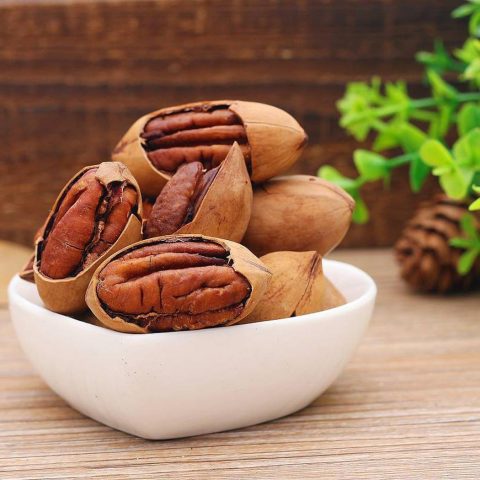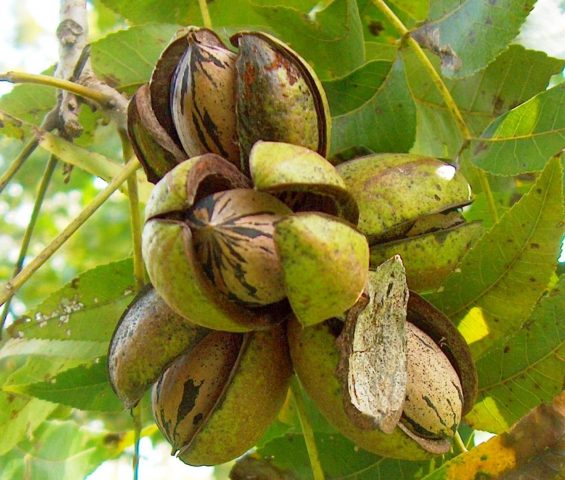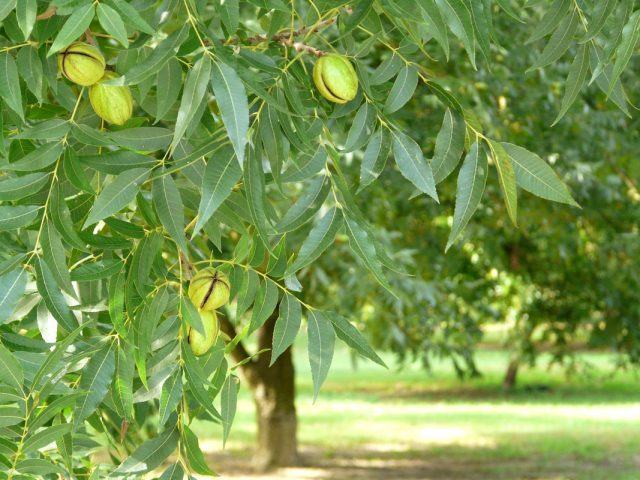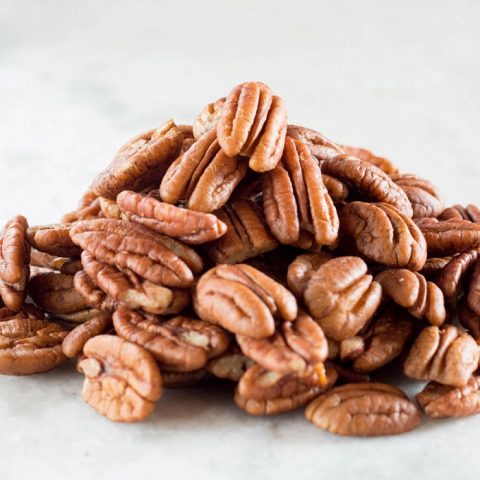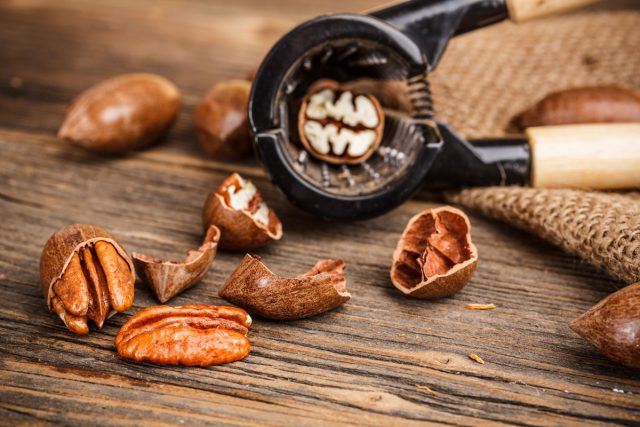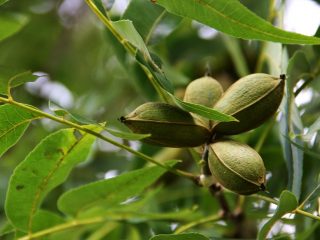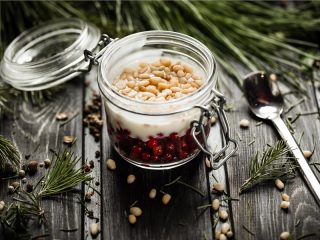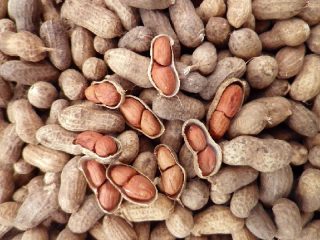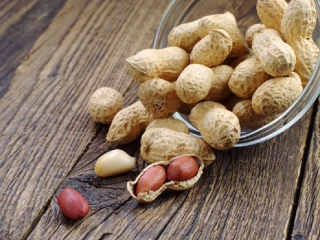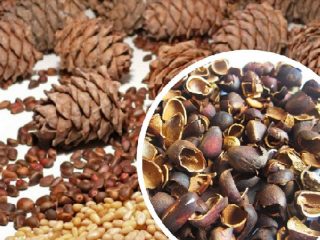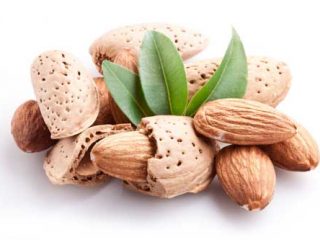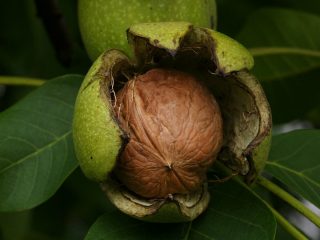Content
The benefits and harms of pecan for the body today is a controversial topic among most people. This product is considered by many to be exotic, but despite this, pecans can increasingly be seen on shelves in stores. Undoubtedly, the nut has a large number of useful properties, but its composition is not fully understood, as a result of which some are afraid to eat it due to the individual characteristics of the body.
Pecan nut description
If we consider the description and photo of the pecan nut, then it is worth noting that the biological name sounds like this - Caria Illinois. This plant belongs to the Walnut family, to the genus Hickory. The tree is deciduous, at home the plant is capable of reaching large sizes. There have been cases when old trees reach 2 m in circumference.
Among the descriptions of appearance, it is worth noting:
- the trunk is thick;
- the bark is wrinkled;
- the crown is quite lush and spreading;
- leaves are rather large, elongated, smooth;
- at the time of flowering, long and fluffy earrings appear.
The flowering period is from May to the end of June. The pollination process is carried out downwind.
What does a pecan look like?
Pecans are called drupes by many. As a rule, the fruits grow in bunches on the tree. Each bunch includes 5 to 10 fruits. Nuts can be up to 4 cm long. The shell is quite dense, with a smooth surface.
The moment the pecans are ripe, they turn brown. After the fruit is completely dry, it begins to crack, resulting in a kernel that resembles a walnut in shape. The kernels are rather sweet, the internal septa are completely absent.
Where does the pecan grow
Grows on fertile and loose soils with sufficient moisture. This type of tree can be found in the United States - in the states of Iowa and Indonesia, the Mississippi Valley, the Texas prairie. Pecans are grown commercially for distribution.
Since some varieties can tolerate low temperature conditions, they can be grown even in the North.
Where does pecan grow in Russia
As you know, pecans prefer to grow in warm areas where the weather is humid. That is why most of the plantings are in North America and the Mississippi coast. These territories are considered the birthplace of trees. Today, this type of plant can be found on the territory of Russia. As a rule, the plant grows in Central Asia, the Caucasus and the Crimea. It was brought to Russia at the beginning of the 20th century. Today it grows in the south of the country.
In the world
Natural habitat is the Mississippi River Valley, Mexico. Prior to this, trees were seen on the western side of the United States, on the coasts of the Pacific Ocean, Italy.
In 1716, pecan was introduced to America, after which it spread to all European countries.For the first time, information about the nut was mentioned by Karl Linnaeus. In 1818, this species was singled out as a separate genus. The cultivation of plants took place in the 18th century. At the beginning of the 20th century, trees began to be grown on the territory of Russia, namely, on the Black Sea coast.
How pecans grow
After the planting material has been planted in open ground, it is worth preparing for the fact that the tree will grow rather slowly for the first 5 years. For example, the annual growth is only 30 cm. As many believe, in this period of time, the root system is being formed.
Fruiting is late enough. As a rule, the collection begins at the end of October. That is why not all varieties can be grown on the territory of Russia, since, due to low temperature conditions, the fruits do not ripen completely, and the yield remains extremely low. With proper care, fruiting occurs after the tree is 12 years old.
What does pecan taste like
Many tend to assume that walnuts and pecans are close relatives, and this is not surprising, because outwardly they are quite similar, but in fact, the differences are colossal.
A distinctive feature is the taste that cannot be compared with other varieties. The pecans taste quite delicate, creamy, with a sweet aftertaste. It is important to take into account that the bitterness of the kernels is completely absent.
The chemical composition of the pecan
The kernels contain a large amount of vitamins, micro- and macroelements that have a beneficial effect on health. Before you start eating, it is worthwhile to first study what is included in the composition, since due to the individual characteristics of the body, there is a possibility that some components will not only not be absorbed, but also cause irreparable harm. The composition includes:
- vegetable fats;
- zinc;
- carbohydrates;
- vitamins of group C;
- iron;
- beta carotene;
- tocopherol;
- sodium;
- proteins;
- magnesium;
- calcium;
- oleic acid;
- retinol;
- B vitamins.
Calorie content of pecan
If we consider the calorie content of pecans, then it is worth noting that the fat content for every 100 g of product is approximately 72%. An example for comparison is:
- walnuts - 62% fat;
- hazelnuts - 61%;
- peanuts - 49%.
The calorie level of 1 pecan is 690 kcal.
Pecan Glycemic Index
Table of the glycemic index of nuts for every 100 g of product:
Name | Calorie content | Glycemic index |
Peanut | 550,7 | 20 |
Dried peanuts | 610,9 | 25 |
Roasted peanuts | 635 | 25 |
Brazilian nut | 673,9 | 25 |
Walnut | 654,7 | 15 |
Pine nuts | 716,8 | 15 |
Cashew | 599,6 | 15 |
Pistachios | 558 | 15 |
Hazelnut | 650,6 | 15 |
Pecan | 702 | 25 |
Benefits of pecans
There is no doubt that the health benefits of pecans are undeniable. It has been proven that the product has many beneficial properties:
- the contained protein allows damaged tissues to recover and grow quite quickly;
- B vitamins are actively involved in metabolism;
- vitamins of group C bring significant benefits to a weakened body;
- copper boosts the immune system;
- magnesium helps to lower blood pressure, normalizes the amount of sugar in the blood.
In addition, pecans are actively used in folk medicine for the treatment of many diseases and for preventive purposes.
What is useful for women
As you know, the female body needs fat, since it is with its help that you can maintain beauty. If the body is deficient in fat, then this will cause significant harm:
- the skin will start to deteriorate;
- hair will fall out;
- the nail plate will weaken.
Many researchers say that due to its beneficial properties, pecans can be used prophylactically to prevent breast cancer, as many women face similar problems personally.
What is useful for men
Many people know that certain foods can improve men's health. This product category includes pecans. Thanks to their beneficial properties, nuts are able to increase testosterone levels, which is considered the main hormone. Testosterone is responsible for:
- reproductive system;
- body structure;
- body hair;
- timbre of voice.
It will be beneficial for every man to consume a small amount of pecans during a snack. This product contains arginine - an amino acid that allows you to increase blood flow to the genitals, resulting in increased potency.
What is useful for pregnant women
As a rule, women during pregnancy pay special attention to their diet, which must be correct. Before you start eating a new product, you should first find out all the necessary information about it, namely, take into account the benefits and harms to the body.
Pecans during pregnancy provide significant benefits:
- folic acid contributes to the proper development and growth of the child;
- vitamins of group C make the body strong enough and resistant to viral infections;
- E group vitamins have a beneficial effect on the skin. During pregnancy, many women are faced with the appearance of stretch marks, which is why it is recommended to eat nuts in small quantities.
At the same time, it is important to understand that, despite all the useful properties, you should not abuse the product. It is recommended to eat no more than 10 nuts per week.
What is useful for children
You can start introducing nuts into the child's diet after he turns 3 years old. If given earlier, then you can harm the child's body, despite all the useful properties of the product, for example, an allergic reaction will appear.
Pecans can also be given from the age of 4, although many experts strongly recommend doing this at the age of 6. Nuts can improve memory, strengthen the immune system, and accelerate growth.
Pecan for diabetes
Any nuts contain a large amount of proteins, minerals, healthy fats and pecans in this case is no exception. Most hazelnuts can lower blood cholesterol levels, prevent the development of heart and vascular diseases, and improve well-being.
Pecans contain a large number of substances that are beneficial for people with diabetes:
- omega-3;
- calcium;
- group D vitamins;
- cellulose.
Thus, with diabetes mellitus, pecans can be consumed. Since it will not only not harm the general well-being, but will also allow you to cope with an already existing disease. The main thing is to use it in moderation, which will allow you not to harm your health.
Pecan for pancreatitis
If an acute stage of pancreatitis is observed or a chronic one is aggravated, then it is forbidden to use any nuts in these situations. This is due to the fact that the nut is a rough product and that is why, when consumed, it has strong mechanical effects on the digestive organs. With pancreatitis, mechanical stress should be avoided completely, which will allow not to cause even more harm to health.
In addition, nuts contain a large amount of fat and vegetable fiber, which is also undesirable for this type of disease. You can eat nuts only after a stable remission has been achieved or the disease has been completely eliminated.
How to peel a pecan
You can peel pecans from the shell using several methods:
- Boil - the nuts are put in a container, poured with water, put on fire, brought to a boil and allowed to cook for 10 minutes.
- Soak - place the nuts in salt water for 2 hours.
- To freeze - Many people argue that frozen nuts are the easiest to peel.
After the pecans are prepared, you can begin to cleanse. For this it is worth choosing a tool. In this case, you can use a hammer or pliers. The nut is carefully cracked, the core is taken out, the grooves, the shell are removed and allowed to dry.
Cooking recipes
Pecan is an exotic product that has conquered a large number of gourmets. Nuts go well with salads, soups, main courses, desserts. Sauces made from pecans, which can later be used for meat or fish, acquire an unusual taste.
Pecans are most commonly used for baked goods and desserts. The most popular are Danish rolls with nuts and maple syrup. In addition, the product can be added to cakes, as a sprinkle, as well as in pies and homemade chocolate.
Pecan Pie
For cooking you will need:
- flour - 175 g;
- pecan - 2.5 tbsp.;
- butter - 225 g (plus 85 g for the filling);
- maple syrup - 150 g;
- rum - 3 tbsp. l .;
- eggs - 3 pcs.;
- granulated sugar - 250 g.
Base preparation process:
- Finely chop the butter.
- Sprinkle with flour, grind well.
- Salt is added to taste.
- Add 3 tbsp. l. water.
- Knead the dough.
- Place in the refrigerator for 1 hour.
- The dough is rolled out to any shape.
- Form the bottom and necessarily the sides.
- Cover with foil.
- Bake for 12 minutes at + 190C.
- Remove the foil.
- Leave for another 10 minutes.
Preparation of the filling:
- Beat eggs.
- Add maple syrup and granulated sugar.
- Beat until a homogeneous air mass is obtained.
- Grind the pecans.
- Add to the filling.
The resulting mass is poured into the dough and baked for about 40 minutes.
Pecan Tincture
As a preventive measure to raise the immune system, as well as in the fight against vitamin deficiency, it is customary to use pecan-based tincture. Everyone has long known what useful properties this product has, as a result of which they actively prepare an alcoholic tincture.
For cooking you will need:
- vodka - 0.5 l;
- pecans - 20 pcs.
Cooking process:
- The pecans are chopped.
- Pour in vodka.
- Let it brew for 30 days in a dark place.
This tincture should be consumed in 1 tbsp. l. every day until the tincture ends. The course of treatment is repeated 2 times annually.
Sauce
To make the sauce you will need:
- garlic - 1 clove;
- basil - 1 small cup;
- pecan - ½ cup;
- olive oil - ½ cup;
- grated hard cheese - 2 tbsp. l .;
- salt to taste.
Cooking process:
- The garlic is chopped in a blender.
- Add basil and pecans.
- Beat up.
- Pour in oil.
- Beat until smooth.
After that, the sauce can be poured into a container, sprinkled with cheese, add salt to taste.
Pecan Nut Daily Value
In order for pecans to really bring significant benefits to the body, and not harm, it is necessary to observe the permissible daily allowance during consumption. A healthy person can eat up to 35 g of pecans daily. This weight is about 15-18 pieces. nuts. It is important to understand that abuse of this product will not lead to anything good.If there is an individual intolerance to the body of some components, then it is worth consulting with a specialist in advance.
Contraindications
Before you start introducing a new type of product into your diet, you should first study the beneficial properties of pecans and contraindications. This is due to the fact that if the recommendations for use are not followed, significant harm to health can be caused. It is important to take into account that, in addition to the beneficial properties, nuts also have a number of contraindications. It is not recommended to use the product for people:
- having individual intolerance to some components;
- with an allergic reaction;
- obese, since nuts are high in calories.
In all other cases, the body will only benefit from the use.
Conclusion
The benefits and harms of pecans for the body have been scientifically proven. A healthy person can include nuts in the diet without fear of causing significant harm to health, but at the same time the permissible daily rate must be observed. In addition to a large number of useful properties, the nut has a delicate taste.
